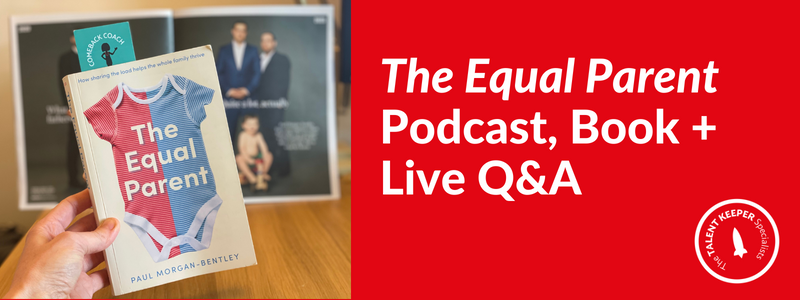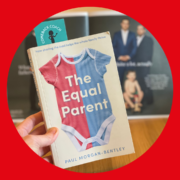The Equal Parent
What can two gay dads teach fathers about being a parent? Quite a lot actually.
That was the headline in The Times on Saturday 25/2/23 about Paul & Robin Morgan-Bentley, a husband and husband duo who had their son Solly via surrogacy. Paul is the author of a new book The Equal Parent (digested below) and you can listen to Jessica’s conversation with Paul & Robin on episode 58 of our podcast COMEBACK COACH. Join us Tuesday 28th March 2023 8-8.45pm for our live online Q&A with Paul.

Comeback Coach podcast – ep. 58
Paul and Robin both went through their own work comebacks after taking many months of Shared Parental Leave after having their son Solley through surrogacy.
We talk about:
-
- their surrogacy journey
- why they took exactly equal amounts of Shared Parental Leave
- how they each prepared to return to work
- how they share the load at home
- why new mothers have it so hard on maternity leave and returning to work
- the uncommon practice things they do to that enables them to have gratifying careers and a happy home life.
Paul & Robin’s 3 pieces of advice (from episode 58)
- You don’t need to hide work from your children.
- It’s good for children to experience parents doing things differently.
- If we want equality in dual earing households both parents must take leave when they become parents – and independent leave (partners having leave at different times rather than together) is the best teacher of all.
The Equal Parent
Paul’s new book, The Equal Parent, is a must if you:
- Chair an employee resource group connected to family, caring responsibility or gender balance.
- Head an Inclusion or Culture team.
- Want societal change around sharing the load of parenthood.
TLDR – The Equal Parent Digested
When our founder, coaching psychologist, Jessica Chivers reads non fiction she underline copiously and write notes about key points/pages in the front cover for ease of reference months/years later. Here are her key page references for The Equal Parent:
- p.14 Benefits accrued when fathers have skin to skin contact with their newborns
- p.25 The ideal design of a hospital birth room.
- p.46 Mothers who sleep train their babies have lower levels of PND.
- p.50 Men should do night shifts when at work and partners are on maternity leave.
- p.84 Comparison of cost of childcare in other countries.
- p.99 Estonia has best education system in Europe and least costly childcare to parents.
- p.102 Surrogacy explained
- p.141 The more women earn in comparison to their partners, the more housework they do (University of Bath, data from 6K heterosexual couples).
- p.142 Pandemic parenting: research by Queen Mary University London + LSE using surveys (n = 1424) and diaries (c 70) found mothers doing much more than fathers.
- p.144 Anna Machin (academic) independent period of leave when baby born is crucial for sexual equality.
- p.146 Prof Michael Lamb: extensive research established that both sexes have capacity to be good parents. Key is men actively caring for children.
- p.151 Fathers are key to child’s mental health in adolescence onwards due to their ‘rough and tumble’ play style and likely to push child physically (no reason mothers can’t do this too).
- p.159 UK Health Visitor service system only has space to record one parent’s data (thereby perpetuating role model stereotypes and unequal responsibility of child).
- p.166 Fatherhood Institute research June 2022 “Bringing Home Baby” finds .”…NHS maternity, health visiting and other family services are failing babies by ignoring their fathers during the first postnatal year.”
- p.168 Even dads in Sweden and Norway feel excluded from health appointments of kids despite them being progressive countries in terms of parental leave.
- p.192 New York University researchers find mothers underestimate baby daughters’ physical abilities (the ramp test age 11 months).
- p.193 Age 6 appears to be when girls switch to seeing themselves less favourably than boys see themselves.
- p.203-211 Malala Yousafzai and father’s potted history of gender activism
- p.222 Children appear to benefit most from having three secure relationships (kibbutzim research).




Leave a Reply
Want to join the discussion?Feel free to contribute!